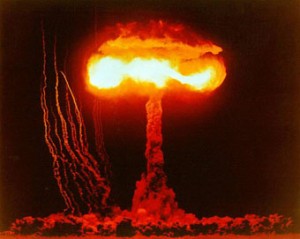 TED Talks are among the most incredible, valuable and interesting resource I’ve yet to find online. With visionaries from all walks of life sharing their knowledge of physics, engineering, religion, music and more they never fail to inform, inspire, expand our worldview, and sometimes, as in the case of the talk I’m about to share with you, scare the hell out of us.
TED Talks are among the most incredible, valuable and interesting resource I’ve yet to find online. With visionaries from all walks of life sharing their knowledge of physics, engineering, religion, music and more they never fail to inform, inspire, expand our worldview, and sometimes, as in the case of the talk I’m about to share with you, scare the hell out of us.
In the talk you can see below Irwin Redlener educates us about the evolution of the nuclear threat from the days when only the US had “the bomb” through present when there are at least nine countries with nuclear capability and when as much as half of the former Soviet Union’s terrifying arsenal is either insecurely stored or has actually gone missing.
From the days of “duck and cover” and “mutually assured destruction” to the present day threat of a single detonation of a low yield “suitcase bomb” or even a conventional explosive impregnated with depleted uranium, Redlener explains the survivability of a nuclear event (an all out nuclear war, Irwin says, is not survivable) and what to do to improve your odds as much as possible.
I rate this video a “must see”, but if you don’t have the 25 minutes to spare or you can’t handle some of the rawer truths of this material here are the bullets:
- Nuclear War is not survivable, a single Nuclear Attack is
- If you are in the vicinity of a nuclear attack do not look towards the blast – if you do you will be blinded either temporarily or permanently
- Keep your mouth open to avoid having your eardrums blown out by the pressure of the blast
- If you are within the immediate vicinity to within half a mile of the blast, your chances are essentially nil, the temperature at the blast site is tens of millions of degrees Fahrenheit.
- If you are from one half to two miles from the epicenter your odds improve to about a 50% chance of surviving the initial blast
- From two to eight miles from the explosion your odds improve to about a 90% chance of survival
- Within the first 15 to 20 minutes after a blast it is critical to get further away from the epicenter. traveling just 1.2 miles further from the blast in a perpendicular direction from the blast generated wind can have a profound impact upon your survival and your long term health due to fallout exposure. This is because the fallout from the mushroom cloud is going to come straight back down on the site of the blast.
- If you cannot get away from the epicenter it is critical that you get sheltered. Best is underground (an old school fallout shelter, a deep basement, or anyplace where earth and concrete separate you from the environment. An alternative is to be above the ninth story above ground (for a ground level detonation)
- Once you find shelter, whether inside or outside the radius of the initial fallout, stay there for at least 72 hours or until you are told by remaining authorities (assuming any exist) that it is okay to venture out.
- As soon as it is possible, remove any clothing that you might have had on during or immediately following the blast and shower to remove residual fallout from your hair and skin.
- Cover as much of your self as possible with clean clothing and bag and bury the clothing you had on during the blast.
- Survivability is largely determined by your willingness to leave the area and stay out of harms way.
- The only way to guarantee survival is to abolish nuclear weapons completely

Thanks for this valuable information. I wish more info was available and that the public would take notice.